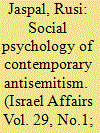|
|
|
Sort Order |
|
|
|
Items / Page
|
|
|
|
|
|
|
| Srl | Item |
| 1 |
ID:
164304


|
|
|
|
|
| Summary/Abstract |
The paper reports findings from a focus group study on representations of Europe, conducted in England in the run-up to the UK EU referendum. Four themes were identified in the analysis: ‘cultured Europe’; ‘little Europe/global Britain’; ‘Europe as a cultural threat’; and ‘Eastern vs. Western Europe’. Analysis of these themes showed that Europe was an ambivalent identity category that could encapsulate contrary ideas such as cosmopolitanism/isolationism and cultural enrichment/undermining. Europe’s relation to Britain was also ambivalent in the data. Britain could be positioned as superior to Europe, sometimes being seen as closer to the ‘European essence’ in the context of the EU’s eastward expansion, which was seen as diluting European culture. But, Britain could also be seen as backward compared to the idea of cosmopolitan continental Europe. These different lines of argument and their ideological underpinnings are explored in the discussion of the findings.
|
|
|
|
|
|
|
|
|
|
|
|
|
|
|
|
| 2 |
ID:
160446


|
|
|
|
|
| Summary/Abstract |
This article provides an exploratory analysis of the life narratives of migrants in the Portuguese-speaking world. By interweaving the life experiences of eight participants in three thematic clusters – ‘shared past’, language and sense of community – we propose a critique of the deep-seated idea of the Lusophone space as a community constructed by the harmonious conviviality of different countries and people. Drawing on contributions from cultural studies, social psychology, anthropology and sociology, we first aim to give voice to the human subjects who embark on migrations and then to understand how the engendered process of identity construction is framed by their social world, simultaneously reframing it. Thus, we aim at shedding light on the ways in which aspects of the political discourses on Lusophony are used (and are instrumental) to the migrants’ identity narrative (re)construction.
|
|
|
|
|
|
|
|
|
|
|
|
|
|
|
|
| 3 |
ID:
190046


|
|
|
|
|
| Summary/Abstract |
This article focuses upon the social psychological aspects of antisemitism. Empirical research into three forms of antisemitism is reviewed through the lens of social psychological theories of social representation, intergroup relations and identity processes. Across research, perceived threat from Jews and Israel is a recurrent theme. The proposed integrative model suggests that negative social representations of Jews and Israel that accentuate intergroup threat can in turn have implications for identity processes at an individual level, mainly by curtailing feels of self-esteem, self-efficacy, continuity and distinctiveness. Identity threat can lead the individual to react defensively by engaging in antisemitism.
|
|
|
|
|
|
|
|
|
|
|
|
|
|
|
|
| 4 |
ID:
071597


|
|
|
|
|
| Publication |
2006.
|
| Summary/Abstract |
Why are international institutions designed in one way and not another? Using the European security and defence policy (ESDP) as a case study, this article suggests that the social representations dominating the national and organizational world of institution-makers are key to our understanding the shape and content of an emerging institution of international security cooperation.A focus on social representations, which are the product of institutional practices, helps to break the interest/idea dichotomy that underpins most theories of preference formation when they try to explain institutional designs.This article shows that foreign and defence policy-makers from France, Germany and the United Kingdom have shaped ESDP by projecting their respective social representations, notably with regard to the role of the state, the nature of security challenges and the purpose of their organization.
|
|
|
|
|
|
|
|
|
|
|
|
|
|
|
|
| 5 |
ID:
096854


|
|
|
|
|
| Publication |
2009.
|
| Summary/Abstract |
This paper analyzes the preferences of European defense actors vis- -vis the European security and defense policy (ESDP) with a view to identifying the main ideational points of convergence and fault lines that structure this policy domain. In an exploratory analysis that relies on an original data-set compiled from systematic interviews conducted with 73 ESDP actors in France, the UK, Germany, and Brussels, we address two research questions. First, what do ESDP actors think about ESDP? Second, can we classify their preferences according to sociological factors that underpin the ESDP domain? To conceptualize the belief system of ESDP actors, we propose a typology that distinguishes (1) the social context in which ESDP actors are embedded and (2) the specific ESDP aspects about which preferences are shaped. Our results suggest that both national and occupational variables play an important role in explaining the preferences of ESDP actors.
|
|
|
|
|
|
|
|
|
|
|
|
|
|
|
|
|
|
|
|
|